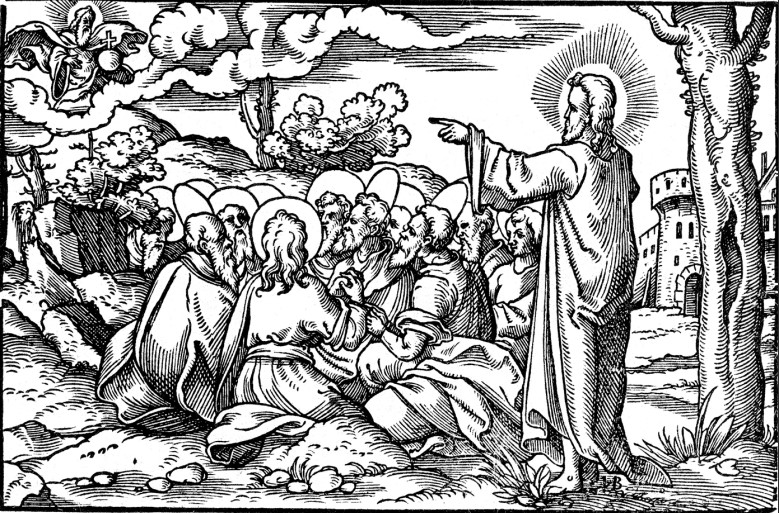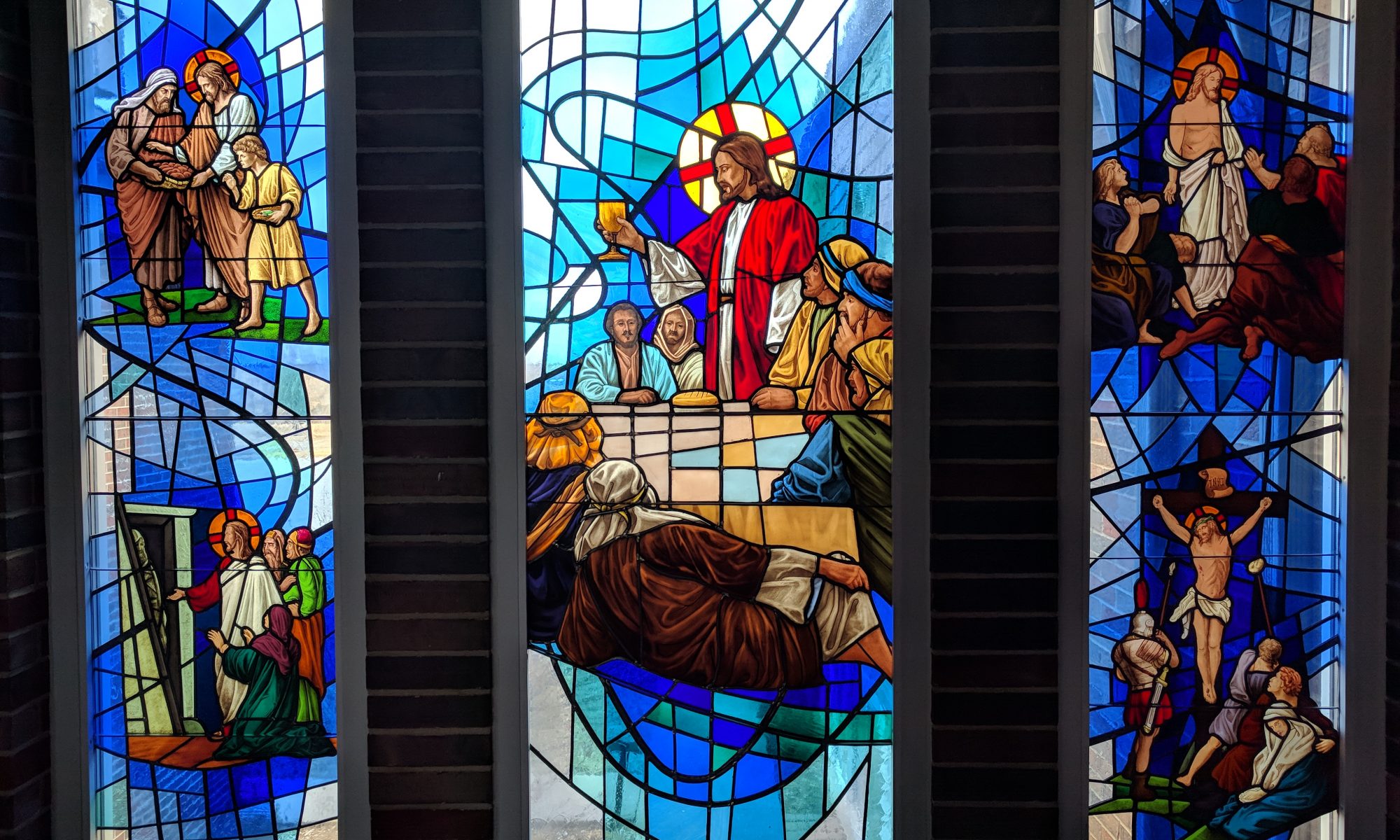
Lessons: Numbers 21:4-9, James 1:22-27, John 16:23-33
Hymns: LSB 463, 459, 663, 766, 741, 668
Grace, mercy, and peace to you from God our Father and our Lord and Savior, Jesus Christ. Amen.
Our Old Testament lesson begins by reporting that the Israelites travelled from Mt. Hor down to the Red Sea to go around the land of Edom. The people of Israel had already wandered in the wilderness for 39 years, meaning their 40-year sojourn was almost over. They were south of the Promised Land and needed to travel eastward and then north to approach the Promised Land from east of the Jordan River.
But there was one problem. The nation of Edom was in their way. You wouldn’t think this would be a problem since the Edomites were the closest relatives to the Israelites. You see, Isaac and Rebekah had two sons, Jacob and Esau. Later, Jacob was given the name Israel, and his descendants became known as the Israelites. Esau’s descendants became known as the Edomites. Jacob and Esau were born right around 2007 B.C., and today’s Old Testament lesson took place in 1407 B.C, about 600 years later. This means the Israelites and Edomites are very distant relatives. Imagine tracing your family tree back 600 years and finding a living descendant to your ancestor’s brother. You would be related, but very distant.
Anyway, Moses sent messengers to the Edomites and asked them very nicely if they could pass through. The messengers said to the King of Edom, “Thus says your brother Israel: You know all the hardship that we have met: how our fathers went down to Egypt, and we lived in Egypt a long time. And the Egyptians dealt harshly with us and our fathers. And when we cried to the Lord, he heard our voice and sent an angel and brought us out of Egypt. And here we are in Kadesh, a city on the edge of your territory. Please let us pass through your land. We will not pass through field or vineyard, or drink water from a well. We will go along the King’s Highway. We will not turn aside to the right hand or to the left until we have passed through your territory” (Numbers 20:14-17).
You would think the Edomites would have complied. The Kings Highway went right through their territory, which was a well-traveled trading route east of the Jordan River and the Dead Sea, connecting Syria to the Red Sea and providing a passageway to Egypt. While mighty men passed through their land, they never had a people as numerous as the Israelites pass through. They refused passage. So the Israelites had to go around Edom. South to the Red Sea, east a little, and then north, going east of the Dead Sea and bypassing Edom.
Perhaps unsurprisingly, the Israelites grew impatient along the way. They were so close to the Promised Land and now they were forced to turn away from it. They began to speak against Moses and against God, saying, “Why have your brought us up out of Egypt to die in the wilderness? There’s no food, no water, and we loathe this worthless manna.”
Their grumbling was a prayer. Prayer is speaking to God in words and thoughts. Their prayer was not a godly prayer. They did not pray with charity, accepting God’s will. Their prayer was not a godly prayer of lament. There is, after all, a place for lament, for the Bible contains prayers of lament. You see, the Bible contains a prayerbook known as the Psalter (Psalms). Of the 150 psalms, about one-third of them may be considered psalms of lament. Yes, those laments are often filled with complaints. But they are done so with faith and trust in God.
Dr. Martin Luther learned all the psalms by heart, and he wrote much about the Psalms. Permit me to read to you a few sentences by Luther on the psalms of lament and psalms of praise. He wrote, “What is the greatest thing in the Psalter but this earnest speaking amid these storm winds of every kind? Where does one find finer words of joy than in the psalms of praise and thanksgiving? There you look into the hearts of all the saints, as into fair and pleasant gardens, yes, as into heaven itself. There you see what fine and pleasant flowers of the heart spring up from all sorts of fair and happy thoughts toward God, because of his blessings. On the other hand, where do you find deeper, more sorrowful, more pitiful words of sadness than in the psalms of lamentation? There again you look into the hearts of all the saints, as into death, yes, as into hell itself. How gloomy and dark it is there, with all kinds of troubled forebodings about the wrath of God! So, too, when they speak of fear and hope, they use such words that no painter could so depict for you fear or hope, and no Cicero or other orator so portray them. And that they speak these words to God and with God, this, I repeat, is the best thing of all. This gives the words double earnestness and life” (AE 35:255-256).
I encourage you, dear brothers and sisters in Christ, to supplement your prayer life with praying the psalms. You could pray one psalm a day, one after the next. Or you could pray the recommended psalm in Portals of Prayer. You could pull out your TLH and follow the charts there to pray the psalms to match the church year or pray the entire psalter every month (pages 164-167). There are many options. But the key is simply to start and keep on praying them. Remember, “All Scripture is breathed out by God and profitable for teaching, for reproof, for correction, and for training in righteousness, that the man of God may be complete, equipped for every good work” (2 Tim. 3:16-17). This includes the psalms, which God has given for us to pray.
Anyway, after the Israelites grumbled, God responded to their ingratitude by sending fiery serpents which bit them, and the people were dying. Finally, the grumbling Israelites recognized their error, repented, and begged that the Lord would take away the serpents from them. The affliction God sent resulted in repentance and trust in God! May God continue to use all things for our good, that we may cling to Christ in faith and not put our trust in the things of the world!
God always answers prayer. He hears the prayers of all Christians who call out to Him. We pray because He has taught us to pray and our trust is in Him. Those who do not trust Him won’t bother with prayer.
The way God answered the prayers of the Israelites who were dying from snake bites is quite interesting. Instead of miraculously eliminating these venomous creatures, God instructed Moses to make a bronze serpent and set it on a pole. If someone who is bit by a snake and looks at the bronze serpent, he will live.
This is not a graven image for them to worship, which was obviously forbidden. Instead, this bronze serpent on the pole was the means by which God chose to heal His people—just like a sacrament.
God continues to use means by which He chooses to save. He saves people through the waters of Holy Baptism. He instituted the ministry so that you can hear the saving Word of Christ and receive the Absolution. He gives you the Body and Blood of Christ for your forgiveness. Sadly, Christians in many denominations object to what I just told you, saying that only faith in Christ saves, not through Baptism, Absolution, or Communion. But they are objecting to what God instituted and says it is. It would have been absurd for the Israelites to reject what God instituted, saying, “I won’t look at the bronze serpent after being bitten, because I’m only saved by faith”—and then beg to God to receive something that He is already offering. Jesus certainly offers forgiveness through the Sacraments.
Years later, the Israelites began to worship the bronze serpent by making offerings to it. They had turned what God designed as a gift into an idol. And so, good king Hezekiah destroyed the bronze serpent 700 years after it was made. Today, people have turned the Sacraments into idols, claiming Baptism is their commitment to Christ or the Lord’s Supper is a sacrifice offered by the priest to earn God’s favor.
Early in His ministry, Jesus spoke of the bronze serpent, saying, “As Moses lifted up the serpent in the wilderness, so must the Son of Man be lifted up, that whoever believes in him may have eternal life” (John 3:14-15). Jesus taught that the bronze serpent foreshadowed His own crucifixion—a type of Christ.
This gets us to an important reality. God saved His people by having them look at a bronze snake after they were bitten by a live snake. You would think the grace of God would be offered in some other way—not through a snake, but through another image. A bronze snake was a picture of death, but it brought life, for it was God’s design. You would also think that since a man brought sin into the world, God would not use a Man to take away the sin of the world. Yet, that’s exactly what God did when sending His Son. The second person of the Holy Trinity takes on human flesh, but was without sin. He is lifted up on the cross and dies.
Many are scandalized by the cross, especially the crucifix. Seeing Jesus on the cross appears to be a symbol of death; but instead, Jesus brings life by way of His crucifixion. For the sinless Son of God is lifted up on the cross to save mankind through His substitutionary atonement. He sheds His perfect Blood as the payment for the sins of the world. This happens because the Lord laid on Jesus the iniquity of us all. Jesus was held accountable for our sin. That is, our sin was imputed to Him. And His righteousness is now imputed to us by faith. As the Baptized, we are credited with having the very righteousness of Christ—we are viewed by God as righteous as Christ Himself, for we have been given His very righteousness.
That is the blessing we have in Christ. It draws us to Him, so that we trust in Him. We can then pray to Him, knowing He will hear every prayer, delight in our prayers, and answer them according to His good and gracious will. The Scriptures teach us to pray without ceasing. Let us do so when we rise up and lie down, before and after eating, and in all occasions of life. We have much to ask, and much more to be thankful for. Amen.
The peace of God which passes all understanding keep your hearts and minds in Christ Jesus to life everlasting. Amen

